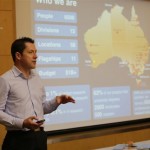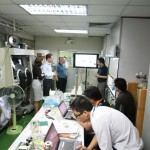The Australian Embassy in Bangkok and NANOTEC organized a special talk on “Solar Cell Research in Australia” at Thailand Science Park. Speakers included Dr. Joe Shapter, Professor at Centre for NanoScale Science & Technology, School of Chemical and Physical Sciences, Flinders University who gave a talk on “Use of Carbon Nanotubes in Novel Solar Cells” and Dr. Scott Watkins, Stream Leader for Organic Photovoltaics at CSIRO Material Science and Engineering who gave a talk on “Renewable Energy – Thin Film Solar Cells”. Participants included private sectors, academia, and research agencies.
“Solar energy has the potential to address current issues in energy production but costs, both in terms of the energy required for production and final price to the consumer” said Dr. Joe Shapter. “Single walled carbon nanotubes are an allotrope of carbon having unique electrical and optical properties and are promising as future photovoltaic materials and it is thus important to investigate methods of exploiting their properties in photovoltaic devices”.
Thin Film Solar Cell is also beginning to make its present known in renewable energy drive. “At CSIRO, the Flexible Electronics Research Theme is developing materials and technologies for applications such as thin film solar cells, organic light emitting diodes and thin film field effect transistors” said Dr. Scott Watkins. “We have the materials and process to help us make fully printed solar cells upto A3 in size”.
“We need to increase research initiatives between Thailand and Australia” said Ms. Jen Tyrell, Counsellor (Education and Science), Australian Embassy. “Australia and Thailand have some things in common, and we are both undertaking research in tropical medicine, population health, manufacturing, renewable energy, environmental science and nanotechnology, and it makes sense to collaborate more in these areas. It is our hope that initiative such as this talk will act as a catalyst to broaden research collaboration opportunities”.
In 2012 Thailand initiated its justification for the development plan of the 10 years National Renewable Energy 2012-2021. The aim of this plan is to reduce Thailand’s reliance on energy import. Over 60% of Thailand’s primary commercial energy demand derived from importation. Oil import took a high proportion at 80% of total domestic oil consumption with increasing trend since the nation is unable to increase domestic petroleum production to meet domestic demand. Substance development on energy will reduce dependency and import of oil and other energy resources, additionally help sharing the risk in providing fuel for power generation which previously depended on natural gas at over 70%.
Renewable energy is expected to significantly substitute natural gas for power generation, especially solar energy, wind energy by type of wind turbine farm, micro hydro, biomass, biogas and waste/garbage.
L-R: Jen, Dr. Joe, Dr. Scott




